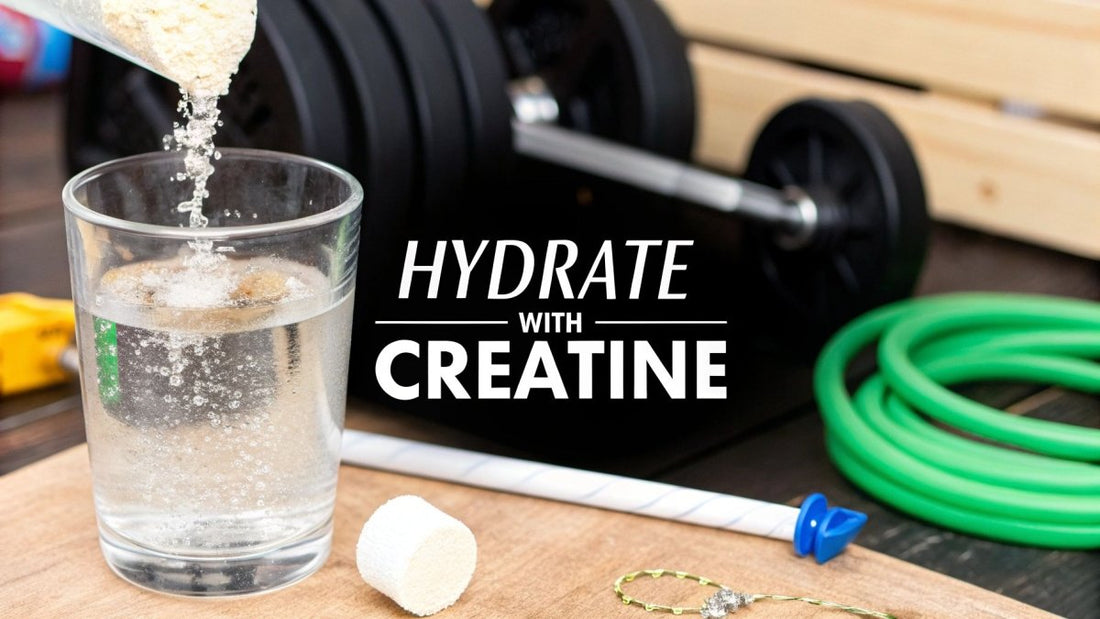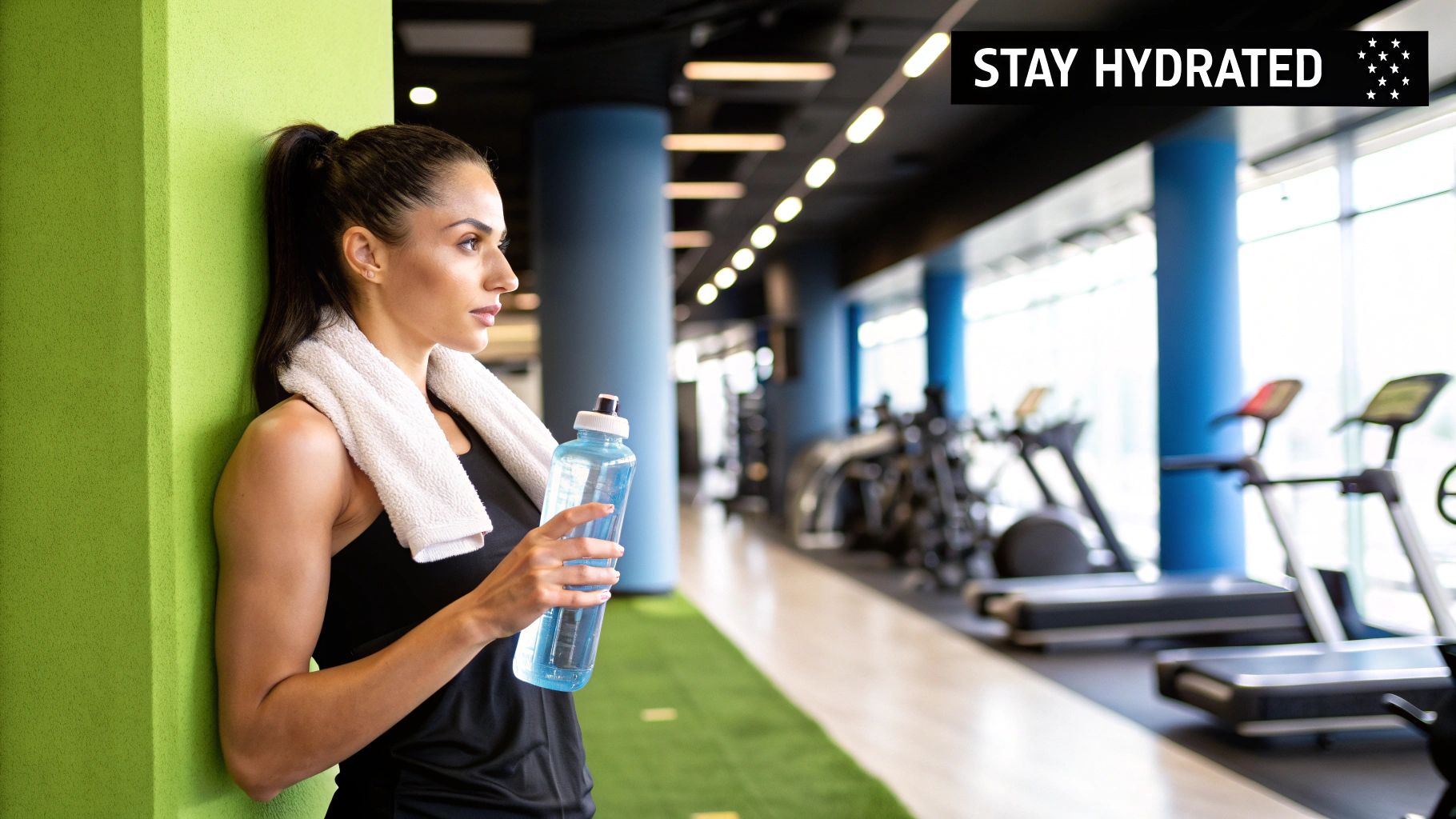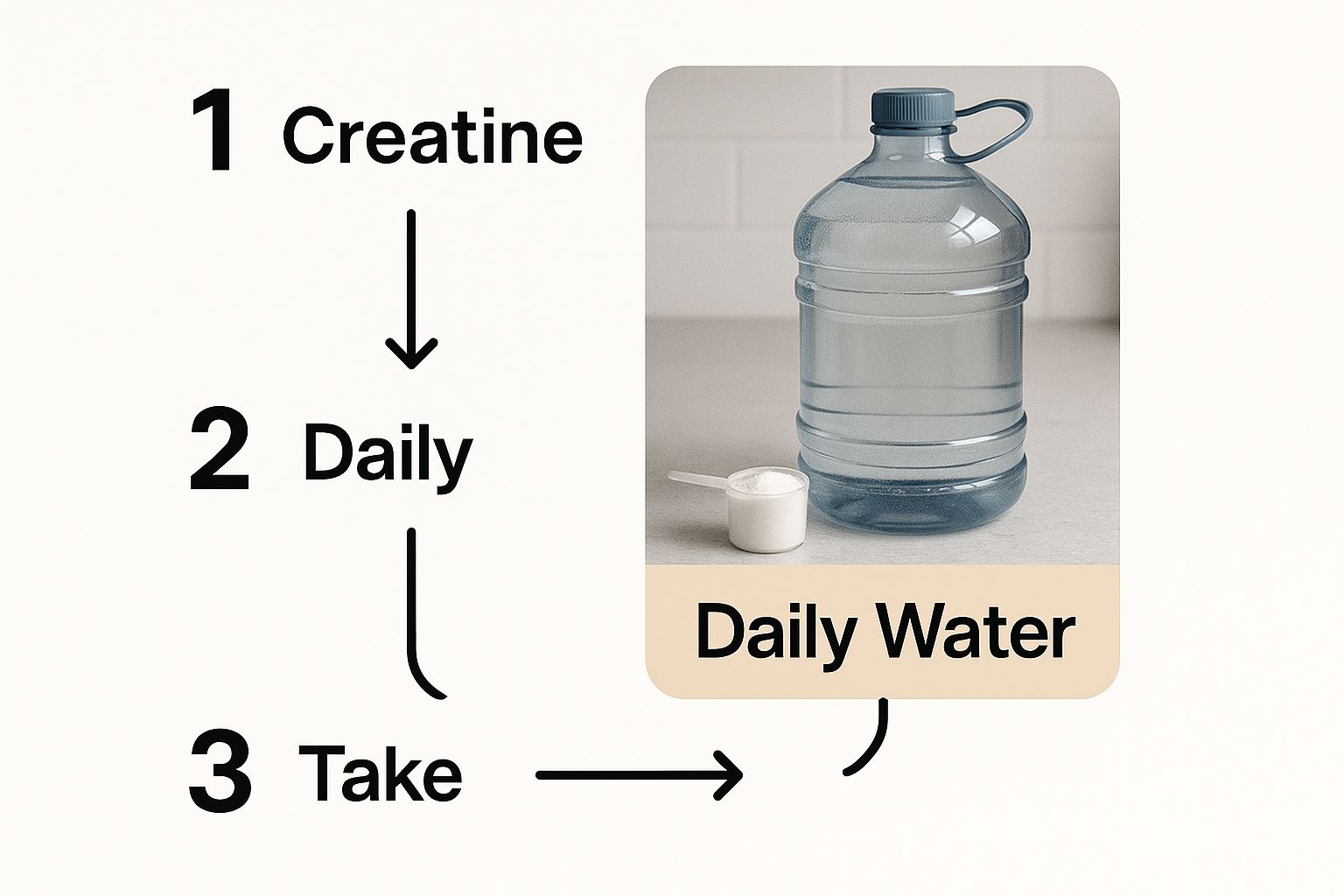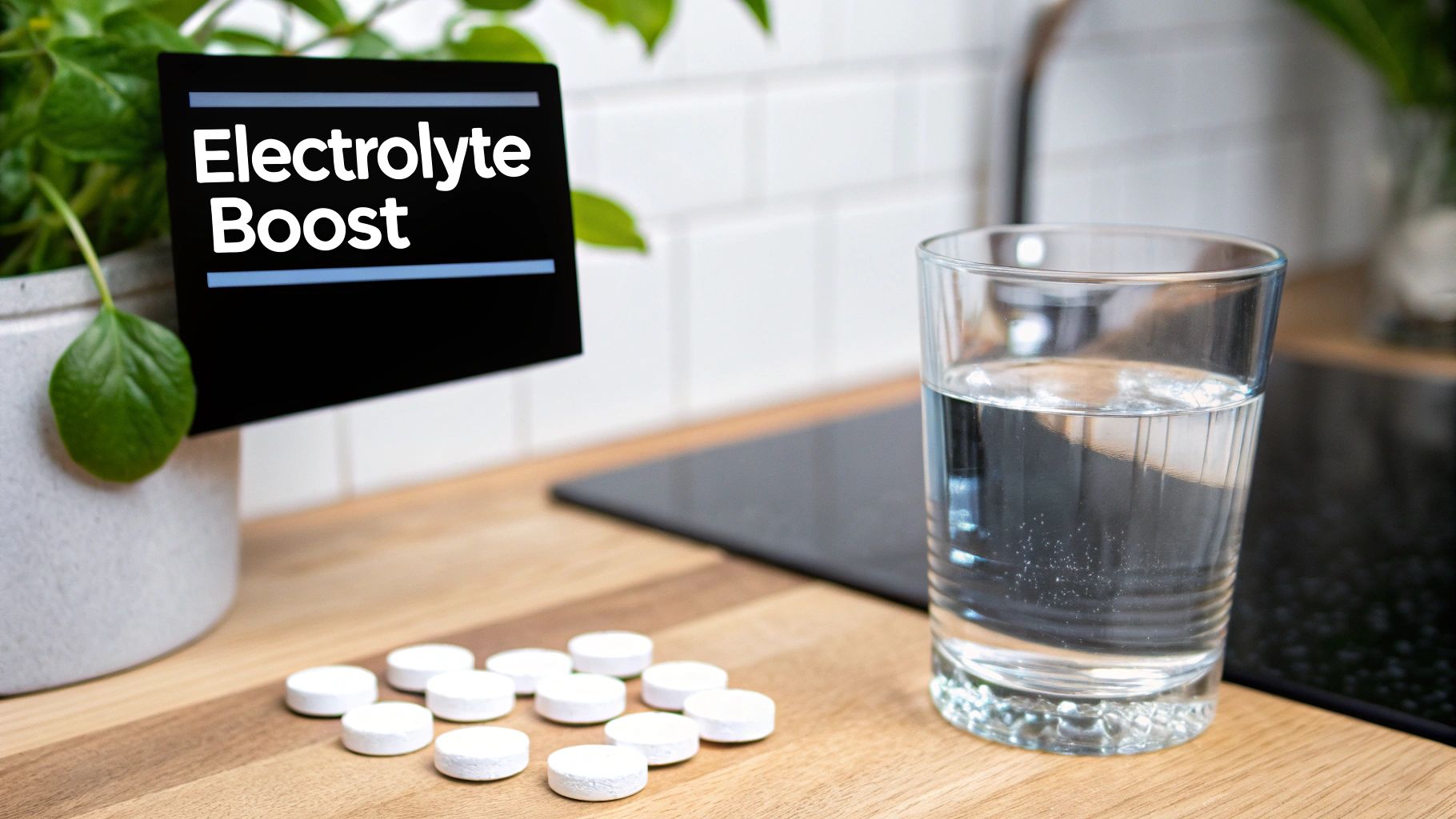
Water Intake with Creatine Explained
Share
If you're taking creatine, getting your water intake right isn't just a suggestion—it's essential for making the supplement work and keeping your body happy. The rule of thumb is simple: drink your normal daily amount of water, and then add an extra 12 to 16 ounces on top of that for every 3 to 5 grams of creatine you take.
This extra water ensures your muscles get the hydration they need to really perform.
The Critical Link Between Creatine and Water

So, why the big fuss about water? Think of creatine as a water magnet for your muscles. Its main job is to pull fluid directly into your muscle cells, a process known as cellular hydration. This is the very mechanism that makes creatine so effective.
Your muscles literally become "thirstier," and this isn't just about staving off dehydration. It's the key that unlocks better performance, faster growth, and all the benefits you're looking for.
Understanding Cellular Hydration
When your muscle cells swell up with this extra water, it sets off a chain reaction of good things. This "cell volumization" is a powerful signal that tells your body to ramp up protein synthesis—the process of building new muscle—while also slowing down muscle breakdown.
Ultimately, this creates the perfect internal environment for:
- Enhanced Strength: Fully hydrated muscle fibers can contract with more force and power.
- Improved Recovery: Water helps shuttle nutrients into the cells and flush waste products out.
- Noticeable Fullness: That "pumped" look you get is partly due to the increased water held inside the muscles.
The connection between creatine and water isn't a new-age gym theory. Foundational research proved that creatine supplementation significantly increases total body water, but crucially, it pulls that water inside the muscle cells where it counts.
This core scientific principle is exactly why you have to drink more water. The supplement simply can't do its job without enough fluid to work with.
To give you a quick reference, here’s a simple breakdown of what your daily water intake should look like when you're on creatine.
Daily Water Intake on Creatine at a Glance
| Hydration Component | Recommended Daily Amount | Reasoning |
|---|---|---|
| Baseline Intake | ~8-10 glasses (64-80 oz) | Covers your body's normal daily hydration needs, regardless of supplementation. |
| Additional Intake | ~12-16 oz per 3-5g of creatine | Directly supports creatine's mechanism by providing the extra fluid needed for muscle cell hydration. |
| Total Daily Intake | ~10-13 glasses (80-104 oz) | Ensures both general health and optimal creatine effectiveness, preventing dehydration. |
This table makes it clear that you're just adding a bit more on top of what you should already be drinking.
If you want to dive deeper into this relationship, check out our complete guide on the importance of drinking water with creatine. Early studies confirmed this by showing that as muscle creatine levels went up, so did the amount of water inside the cells, proving the direct link.
How Creatine Affects Your Body’s Water Balance
To really get why water is so critical when you're taking creatine, we need to look at what's happening inside your muscles on a microscopic level. Creatine is what’s known as an osmolyte—a fancy term for a substance that pulls water toward it.
Imagine a sponge. When you put a dry sponge in water, it soaks it all up, right? Creatine does something very similar inside your muscle cells.
When you start supplementing, the creatine concentration inside your muscles skyrockets. This makes the inside of your muscle cells "saltier" than the area outside them, creating an osmotic gradient that acts like a powerful magnet for water. This process, called osmosis, pulls water from your bloodstream and other tissues directly into your muscle fibers.
The Muscle-Building Power of "Cell Volumization"
This rush of water causes your muscle cells to swell up. This is a process called cell volumization, and it's one of the key reasons creatine works so well.
Don't mistake this for the soft, puffy water retention some people worry about. That's subcutaneous water, held under the skin. Cell volumization is functional water held inside the muscle, which is why it often makes your muscles look and feel fuller and harder.
But this swelling isn't just for looks. It sends a powerful signal to your body.
Think of a well-watered plant versus a wilted one. The full, hydrated plant is primed for growth. Your muscle cells are the same. This increased volume is interpreted as a sign of health, triggering a cascade of muscle-building responses.
This internal pressure tells the muscle cell to ramp up protein synthesis—the actual process of building new muscle. At the same time, it helps put the brakes on protein breakdown, protecting the muscle you've already built. It's a powerful one-two punch that creates the perfect environment for getting stronger and bigger.
This isn't just theory; it's well-supported by research. Studies have shown that this "hyperhydration" of the muscle is a core part of how creatine delivers results. By drawing water in, it not only helps build and preserve muscle but also supports the creation of other molecules essential for adapting to training and recovering faster. You can find more detail on these cellular adaptations on gssiweb.org.
Calculating Your Ideal Daily Water Intake
Forget vague advice like "just drink more water." Figuring out how much you need when taking creatine isn't guesswork—it's about a simple, personalized calculation. Let's break down how to find your daily target so you can properly support creatine's muscle-hydrating effects without going overboard.
The Three-Step Formula
Here’s a straightforward way to nail down your daily water goal:
-
Find Your Baseline: A solid rule of thumb is to drink half your body weight in ounces of water each day. So, if you weigh 180 pounds, your starting point is 90 ounces (about 2.7 liters). Simple enough.
-
Add for Creatine: Now, account for the supplement. For every 3-5 gram serving of creatine you take, tack on an extra 16-32 ounces (that’s about 0.5-1 liter) of water to your daily total. This is the extra fluid your muscles are going to pull in.
-
Factor in Your Activity: Finally, adjust for your lifestyle. If you're hitting a tough workout or sweating it out in hot weather, add another 12-16 ounces to make up for what you lose.
Putting It All Together: A Real-World Example
Let's see what this looks like for that same 180-pound person.
Their baseline is 90 ounces. They take a standard 5-gram scoop of creatine, so we'll add 24 ounces (right in the middle of our 16-32 oz range). It’s a heavy leg day, so they’ll add a final 12 ounces for sweat loss.
Daily Goal: 90 oz (baseline) + 24 oz (creatine) + 12 oz (activity) = 126 ounces.
This simple math gives them a clear, actionable target for the day.
This visual guide helps break down how to plan your daily water intake while supplementing with creatine.

As you can see, your total goal is just a combination of your body’s basic needs plus the extra required for your creatine supplement and training.
Of course, it’s not just about how much water you drink, but the quality, too. If you’re focused on optimizing your health, looking into the best water filtration systems can be a game-changer. And for a deeper dive on matching your creatine dose to your fitness goals, check out our complete creatine dosage guide.
Recognizing Dehydration Signs on Creatine
Because creatine's whole job is to pull water into your muscles, your body's overall demand for fluids naturally goes up. This just means you have to be a little more on top of your water intake than usual. The problem is, thirst is a lagging indicator. By the time you feel that dry, parched sensation, you’re already behind.
Think of it like the low-fuel light in your car. You can still drive for a bit, but you're running on fumes. Catching the subtle signs of dehydration early is the real key to staying safe and getting the results you want.
Early Warning Signs to Watch For
Don't wait until you're desperately thirsty. Instead, keep an eye out for these common red flags that your fluid levels are dipping:
- Persistent Fatigue: Feeling wiped out or sluggish for no obvious reason? Dehydration directly messes with your body's energy production, and it's often the first thing people notice.
- Nagging Headaches: Even a slight drop in hydration can cause your brain tissue to temporarily shrink and pull away from your skull. The result? A dull, throbbing headache.
- Unexpected Muscle Cramps: While there are many reasons for cramps, a lack of fluid and electrolytes is a classic trigger, especially when your muscles are already calling for more water thanks to creatine.
The easiest and most reliable daily check is your urine color. You're aiming for a pale, lemonade-like yellow. If you see dark yellow or amber, that's your body screaming for water.
Being proactive with hydration isn't just about avoiding problems—it's a performance enhancer. When you learn to read your body's signals, you ensure creatine is working for you. A well-hydrated body is primed for strength, recovery, and growth, letting you cash in on all the hard work you're putting in. So, keep that water bottle close and listen to what your body is telling you.
Debunking Myths About Creatine and Hydration
There's a ton of misinformation floating around about creatine and hydration, and most of it creates unnecessary fear. Let's cut through the noise and tackle the biggest myths so you can supplement with confidence.
Myth 1: "Creatine Will Wreck Your Kidneys"
This is probably the most stubborn myth out there. The concern comes from a misunderstanding of how kidney function is measured. Doctors look at creatinine, a byproduct of muscle metabolism, and elevated levels can signal kidney issues.
Taking creatine naturally increases creatinine levels slightly. But this is a normal, expected outcome and not a sign of kidney damage in healthy people. Think of it this way: eating a high-protein meal temporarily raises urea levels in your blood. That doesn't mean your kidneys are failing; it just means they're doing their job. Same logic applies here.
Myth 2: "You'll Get Puffy and Bloated"
Another common fear is the dreaded "creatine bloat." People imagine a soft, puffy look, but this confuses two totally different kinds of water retention. The water creatine draws into your body is primarily intracellular—it goes inside your muscle cells.
This isn't the kind of bloating you get from a salty meal. It's called cell volumization, and it’s a good thing. It makes your muscles look fuller and harder, and it’s one of the key signals that tells them to grow stronger. You're hydrating your muscles, not holding water under your skin.
If you want to dive deeper into how creatine works for different body types, our guide on creatine for women has some great insights.
Myth 3: "It Causes Dangerous Dehydration"
Finally, there's the worry that since creatine pulls water into the muscles, it must be dehydrating the rest of the body. This just isn't how it works. As long as you’re consciously drinking a bit more water throughout the day, your body will have more than enough fluid to go around.
Creatine is one of the most heavily studied supplements on the planet. Time and time again, research has shown that when used correctly, it actually improves your hydration status by increasing total body water. You can find out more about the decades of research confirming creatine's safety and effectiveness on gssiweb.org.
Hydration Strategies for Loading and Maintenance

Your body’s need for water isn't set in stone—it shifts depending on how you're using creatine. The two main approaches, the loading phase and the maintenance phase, each call for a different hydration strategy to get the best results safely.
The loading phase is that optional, high-intensity first week where you take a larger dose—usually 20 grams a day—to saturate your muscles fast. During this time, your muscles' demand for water goes way up. Think of it like trying to fill a reservoir quickly; you need a much higher volume of water flowing in to get the job done.
To keep up, you’ll want to drink an extra 32 to 64 ounces (that’s about 1-2 liters) of water on top of your usual daily amount during that loading week. This extra fluid is non-negotiable for preventing dehydration and helping the creatine work its magic.
Adjusting for Long-Term Maintenance
Once that initial week is over, you'll scale back to a daily maintenance dose of 3-5 grams. Your water needs will also dip, but you won’t go back to your old pre-creatine baseline. From here on out, aim for a consistent extra 12 to 16 ounces of water each day. This steady intake keeps your muscle creatine stores full and your cells properly hydrated for peak performance.
Here are a few practical ways to stay on top of your hydration game:
- Time It Right: Don't just chug water randomly. Sip it consistently throughout the day, but give special attention to your workout window by drinking before, during, and after you train.
- Carry a Bottle: This is a classic for a reason. Having a large, marked water bottle in sight is a great visual reminder and makes it simple to track your progress.
- Eat Your Water: Don't forget that many foods have high water content. Adding things like cucumbers, watermelon, and oranges to your diet gives you a nice little hydration boost.
This isn’t just bro-science, either. Research backs up the connection between creatine and body water. For instance, one study found that female dancers supplementing with creatine saw an increase in their total body water and lean mass. You can dive deeper into how creatine modulates body water on tandfonline.com to see the science for yourself.
Got Questions? We've Got Answers
Let's clear up some of the common questions that pop up when talking about creatine and hydration. Getting these details right will help you supplement with confidence and get the best possible results.
Does the Type of Creatine Change How Much Water I Need?
Not really. You'll see different forms out there, like creatine HCL or ethyl ester, often marketed as having better absorption. But at the end of the day, they all work based on the same principle: pulling water into your muscle cells.
Because creatine monohydrate is the king—the most studied and proven form by a long shot—all the standard hydration advice is based on how it behaves. Your best bet is to stick with those trusted guidelines, no matter which fancy new version you're using. The goal is always the same: support that crucial cell hydration process.
What if I Don't Drink Enough Water With Creatine?
Skipping the extra water is like buying a high-performance engine and then never putting oil in it. You’re not just missing out on the benefits; you're actively setting yourself up for problems.
Without enough fluid, creatine struggles to do its main job of pulling water into your muscles. This blunts the "cell volumization" effect, which is one of the key signals for muscle growth.
Even worse, you're paving the way for dehydration. That means you're far more likely to deal with frustrating headaches, brain fog, fatigue, and muscle cramps that can completely wreck your workouts. Staying hydrated ensures creatine works for you, not against you.
Is It Possible to Drink Too Much Water?
While it’s technically possible to drink a dangerous amount of water (a condition called hyponatremia), it’s incredibly rare for a healthy person. You'd have to drink an enormous volume of fluid in a very short amount of time.
This is why we stick to sensible guidelines. We're not talking about chugging a gallon of water before you walk out the door. The goal is just to add an extra 16-32 ounces (that's about 0.5 to 1 liter) to what you already drink, sipped throughout the day. Listen to your body, aim for the target, and you'll be fine.
Do My Morning Coffee and Protein Shakes Count?
Absolutely. Any fluid you drink contributes to your total daily water intake. Even coffee, which has a mild diuretic reputation, is a net positive for hydration. And of course, the liquid you use for your protein shake counts, too.
That said, make plain water your number one priority. Think of it as the bedrock of your hydration strategy. Everything else—your coffee, shakes, or tea—is just a bonus.
This simple habit makes sure you’re getting pure, clean hydration without adding extra calories, sugar, or other stuff you don't need.
Tired of the whole powder-and-shaker routine? Smash.com makes getting your daily creatine ridiculously easy. Our delicious creatine gummies pack the full 5g dose you need into a simple, tasty treat. Give them a try and feel the difference for yourself. https://smash.com